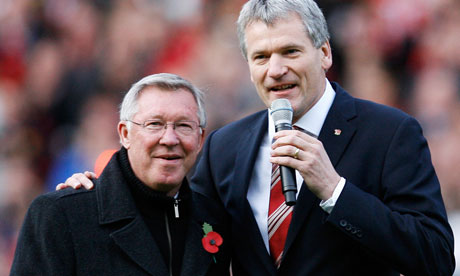
David Gill, the Manchester United chief executive, has revealed he is not immune to Sir Alex Ferguson's infamous "hairdryer" treatment in an insight into the manager's tendency to "blow his top" behind the scenes at Old Trafford.
Gill's working relationship with Ferguson is comfortably the strongest of any chief executive or chairman during the manager's quarter of a century in charge and can be accurately gauged by the fact it was the chief executive's idea last weekend to mark the 25th anniversary by renaming the North Stand at Old Trafford the Sir Alex Ferguson Stand and commission a statue, to be in place by August.
Gill, who replaced the Chelsea-bound Peter Kenyon in 2003, reflected that he and Ferguson now had a relationship in which "we trust each other implicitly" and, asked to describe the longest-serving manager in the business, he talked of someone who was "competitive, determined, generous and fascinating".
However, there was also an insight into an occasionally tempestuous relationship in which Gill's position as the highest-ranking employee at Old Trafford, acting as the conduit with the Glazer family, did not always spare him the explosions of rage that led to the "hairdryer" tag, so named because of the way Ferguson will stand in front of his victim at such close proximity and shout so hard it resembles a blast of hot air.
"I wouldn't say I'm exempt from the hairdryer but I would say I can give as good as I get," Gill said. "The important thing I notice from Alex is that there has been probably half a dozen of these hairdryer-type moments, give or take, over the last eight years as chief executive [but] he never sulks.
"He never carries it on and we move on. That's a great thing about Alex – he can have an opinion and blow his top but it's forgotten like that, and I think that's the true measure of the man."
Ferguson has talked in the past week of continuing for another "three or four years yet" and Gill is acutely aware that the task of finding the manager's replacement may represent the most difficult challenge of his time at Old Trafford.
"Certainly it'll be difficult to replace him," he said. "It's naive to say anything other than that, but we are a great club whose values go back in history to the 1950s and 1960s and the last 25 years with Alex. To continue with that, the new manager needs to understand those values and the vision for the club and must buy into that.
"The important point is the new manager, whenever that may be and whoever that may be, will be taking over a great club and Alex in particular will want to make sure he inherits a great squad. That's our goal – to make sure when the new manager comes in he has a great squad in terms of age and profile."

